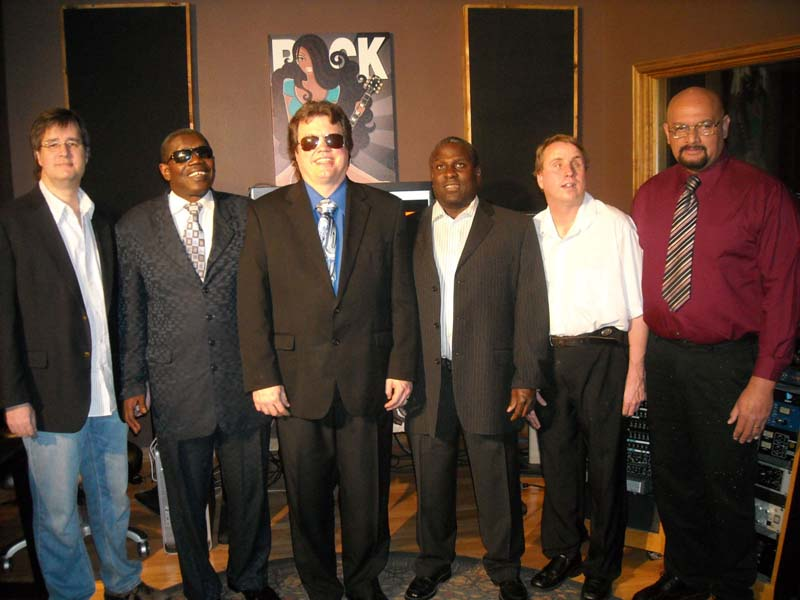Lessons from the Leader of Blue Mist.
by Eric Clow
We were pleased to round out our 2020 Fall Songwriting Series with a workshop led by Robert Kelley, our 2020 Artist of the Year and long-time front man of the popular Blue Mist Band. We honored Robert for his 40+ years of entertaining diverse audiences in Central Texas. As five of the group’s six members graduated from Texas School for the Blind, we were also cognizant of the awareness and opportunities he has made possible for our community of disabled musicians.
We invited Robert to chat with us and share a bit of his wisdom gleaned from many years of work in the music industry, writing and performing both original music and covers. He certainly delivered! Here is what I found most useful. View Robert Kelley workshop.
“Vision can distract you from the music itself.”
Right from the start, Robert’s songwriting session was distinct because he did not activate his video. Others might have done so out of shyness or to hide the clutter of their homes, but Robert intended to share a glimpse of his world—one where the ears serve as the eyes. More importantly, he hoped to impart a critical lesson: Music is not a visual art form. It’s auditory, learned and played with the ears.
Indeed, this may seem rudimentary knowledge, but it comes from a place of hard-earned experience. Robert fronts Blue Mist, a band in which several members are visually impaired. If they get lost in a performance, they cannot look to each other for cues; they must navigate by sound. For the sight-minded such as myself, vision can become a crutch, a distraction that detracts from truly listening.
Prompt #1: Put on a favorite piece of music, close your eyes, and just listen. While not technically a writing prompt, you may still be surprised by what you notice—and learn.
“Covers are the things that keep you employed.”
Blue Mist has been a staple of Austin’s live music scene for 40 years, playing bars, restaurants, weddings, and other events. Though the band writes superb original music, they are possibly best known for their covers—a lively collection of soul, R&B, pop, and jazz. As Robert explained, audiences like covers because it’s music they know and love, music that relieves them of their daily stresses.
I myself have always been wary of performing covers because I felt that my own talents would fail to exceed or in the very least, match the quality of the source material. Writing songs that suit my specific vocal and instrumental capabilities appeared to be a better option. But after hearing Robert’s perspective, I reconsidered my hesitation. I recognized that I should judge my covers not by how well they compare to the originals but by how well the audience receives them.
Prompt #2: How do you express yourself?

Play (and write) what you feel.
When Robert brings lyrics or an arrangement to the band, he encourages them to play what they feel. In so doing, they create a song that combines the unique insights and talents of each member of the band – a song that changes and evolves as opposed to “just me.” The reverse is also true: when one of his bandmates has an idea for a chord progression or melody, he crafts lyrics inspired by the feeling that music evokes.
Prompt #3: Write a few lines that tell people something about you.
Write from the perspective of bass and drums because that’s the foundation.
Robert was initially a drummer and singer, so he writes with drums in mind. In contrast, since I first made music with guitars, then keyboards and synthesizers, I tend to think in terms of chords. That approach, however, bears inherent limitations. Chords undoubtedly form the bedrock of harmony, but the groove, the thing that impels you to stomp your feet and move—that’s the rhythm section.
Here is why Robert’s advice is spot-on: if every time you write from the chords, you risk repeating rhythmic ideas instead of discovering new ones. Working up from the foundation also instills a holistic orientation where each instrument has equal footing. This creates space for accidents and spontaneity; in short, magic. In my own experience, focusing on the drums and bass opened the door for fresh songs to emerge, which propelled my music in exciting directions.
Prompt #4: What would you like people to know about your writing process?
Pro Tips:
- Add a modulation (key change) for variety.
- Always carry a recording device (tape recorder, voice memo-style phone app, etc.) to log ideas as they come. Keep it at your bedside, so you can capture those fleeting dream melodies, too.
You can watch Robert Kelley’s full presentation on our YouTube channel below. Sign up for our Community Conversations email list and follow us on social media to receive updates on future songwriting sessions!
Visit Blue Mist’s website for a listing of their upcoming gigs.
